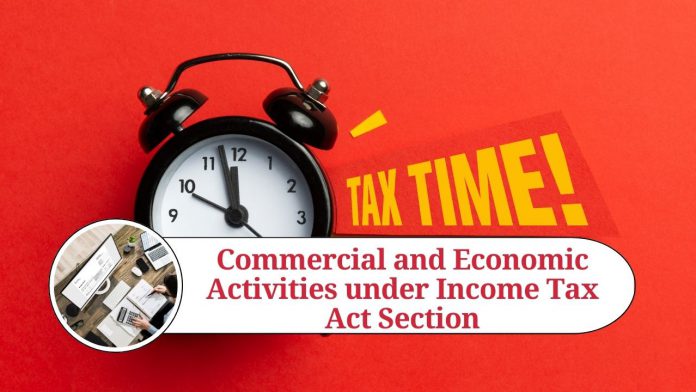The Income Tax Act of 1961 is the backbone of the Indian taxation system, and it governs various commercial and economic activities that are subject to taxation. Under this Act, various provisions and rules have been laid down to regulate the taxation of different types of income.
One of the critical aspects of the Income Tax Act is the taxation of commercial and economic activities. The Act covers a wide range of such activities, including business, profession, trade, and commerce, among others.
Business
Business, as defined under the Income Tax Act, includes any trade, commerce, manufacture, or adventure in the nature of trade. The Act levies a tax on the profits earned from the business after deducting allowable expenses. The tax is levied on the total income earned from the business and is charged at a flat rate.
Profession
Profession, as defined under the Income Tax Act, includes any vocation that requires specialized knowledge, skills, or training. This includes doctors, lawyers, accountants, and engineers, among others. The Act levies a tax on the income earned by the professionals after deducting allowable expenses. The tax is levied on the total income earned from the profession and is charged at a flat rate.
Trade
Trade, as defined under the Income Tax Act, includes any buying and selling of goods. The Act levies a tax on the profits earned from the trade after deducting allowable expenses. The tax is levied on the total income earned from the trade and is charged at a flat rate.
Commerce
as defined under the Income Tax Act, includes any activity related to the buying and selling of goods or services. This includes activities such as wholesaling, retailing, and trading, among others. The Act levies a tax on the profits earned from the commerce after deducting allowable expenses. The tax is levied on the total income earned from the commerce and is charged at a flat rate.
Apart from the above-mentioned commercial and economic activities, the Income Tax Act also covers various other income sources such as rent, interest, capital gains, and dividends, among others.
Under the Act, all income earned from commercial and economic activities is subject to tax. The tax liability is calculated based on the income earned, and various deductions and exemptions are allowed to reduce the tax liability.
In conclusion
the Income Tax Act covers a wide range of commercial and economic activities and regulates the taxation of such activities. The Act levies a tax on the income earned from such activities after deducting allowable expenses. It is essential for businesses, professionals, traders, and other individuals involved in commercial and economic activities to be aware of the provisions and rules of the Income Tax Act to avoid any legal complications or penalties.
Read more useful content:
- section 234e of income tax act
- section 286 of income tax act
- section 90a of income tax act
- section 40a(7) of income tax act
- section 226(3) of income tax act
- section 24 of income tax act
Frequently Asked Questions (FAQs)
Q. What is the Income Tax Act?
The Income Tax Act is a law that governs the taxation of income in India. It covers various sources of income, including income earned from commercial and economic activities.
Q. What are commercial and economic activities?
Commercial and economic activities refer to any activity related to trade, commerce, profession, or business that involves the production, buying, or selling of goods or services.
Q. What is the tax rate on income earned from commercial and economic activities?
The tax rate on income earned from commercial and economic activities is charged at a flat rate, which is currently 30% for businesses and professions.
Q. Can I deduct expenses from my income earned from commercial and economic activities?
Yes, you can deduct certain expenses from your income earned from commercial and economic activities. The Income Tax Act allows for various deductions and exemptions, such as depreciation, rent, interest, and other expenses, which can help reduce your tax liability.
Q. Do I need to register for GST if I am engaged in commercial or economic activities?
Yes, if your turnover exceeds a certain threshold, you are required to register for Goods and Services Tax (GST) under the GST Act. The registration threshold varies based on the type of business and state in which you operate.
Q. What are the penalties for non-compliance with the Income Tax Act?
Non-compliance with the Income Tax Act can result in penalties and fines. Depending on the nature and severity of the violation, the penalties can range from a monetary penalty to prosecution and imprisonment.
Q. How can I stay compliant with the Income Tax Act?
To stay compliant with the Income Tax Act, you should keep accurate records of your income and expenses, file your tax returns on time, and pay the required taxes. You should also stay updated on any changes to the tax laws and seek professional advice if necessary.
Q. Can I carry forward losses from my commercial or economic activities to future years?
Yes, the Income Tax Act allows you to carry forward losses from your commercial or economic activities to future years. However, there are certain conditions and limits on the amount of loss that can be carried forward, which vary based on the type of loss and the nature of the business or profession.




















